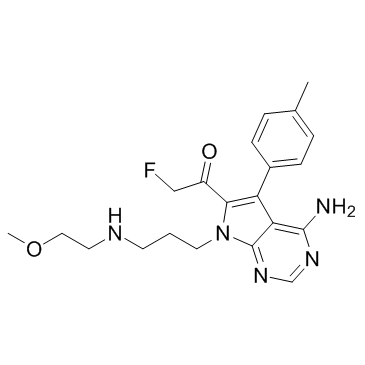| Description |
FMK-MEA is a potent and selective p90 Ribosomal S6 Kinase (RSK) inhibitor.
|
| Related Catalog |
|
| Target |
p90 RSK[1]
|
| In Vitro |
FMK-MEA is a water-soluble derivative of fmk. FMK-MEA treatment inhibits RSK2 kinase activity in diverse, highly invasive human cancer cell lines including 212LN, M4e, A549, and SKBR3 cells. Treatment with the RSK-specific inhibitor FMK-MEA significantly attenuates RSK2 activity, as assessed by the phosphorylation levels of Ser-386 and the consequent invasive ability of A549 cells[1].
|
| In Vivo |
FMK-MEA treatment (80 mg/kg/day for 16 days by intraperitoneal injection) in highly metastatic M4e cell xenograft nude mice results in a significant attenuation of LN metastasis. FMK-MEA treatment has no effect on the tumor size, and the proliferation rate of the primary tumor[1].
|
| Animal Admin |
Mice[1] For FMK-MEA treatment, each of the nude mice (athymic nu/nu, female, 4-6 weeks old) are injected with 0.5×106cells/100 μL of PBS submandibular to the mylohyoid muscle. On day 5 after injection, mice are divided into two groups with similar average weights with each group receiving either FMK-MEA or PBS. Each mouse is administered 80 mg/kg of FMK-MEA daily by intraperitoneal injection from 5 days after the xenograft for 16 days total. The control group receives PBS alone on the same schedule. Tumor growth is recorded. Mice are sacrificed after 16 days post drug treatment[1].
|
| References |
[1]. Li D, et al. The prometastatic ribosomal S6 kinase 2-cAMP response element-binding protein (RSK2-CREB) signaling pathway up-regulates the actin-binding protein fascin-1 to promote tumor metastasis. J Biol Chem. 2013 Nov 8;288(45):32528-38.
|
